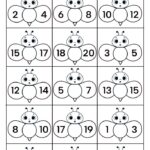Teaching children about size is one of the foundational steps in early math development. Understanding the concepts of tall and short helps preschoolers build vocabulary, develop observational skills, and compare the world around them in meaningful ways. In this blog post, we delve into the importance of size comparisons and provide the best printable long and short worksheets for preschool and homeschool use.
Whether you’re a teacher planning your next math center or a parent looking to reinforce learning at home, these tall and short worksheets are your go-to tools for teaching in a fun way. Let’s explore the benefits, download options, teaching strategies, and creative ways to use these resources!
Why Teach Tall and Short to Preschoolers?
Understanding size differences is an essential cognitive skill that provides the foundation for future math concepts like measurement, spatial awareness, and data organization. Why teaching tall vs. short is so important:
1. Builds Early Math Vocabulary
Introducing words like “tall,” “short,” “long,” and “short” helps children describe the things they see, supporting communication and comprehension skills.
2. Develops Visual Discrimination
Comparing tall and short objects trains children to notice differences and pay close attention to details.
3. Strengthens Fine Motor Skills
Our printable worksheets encourage coloring, circling, tracing, and pointing — activities that improve pencil grip and hand-eye coordination.
4. Supports Real-Life Learning
Children use these concepts every day—whether comparing plant heights, family members, or toys. These activities prepare them to apply their learning in everyday contexts.
🎯 Skills Practiced with Tall and Short Worksheets:
Our worksheets target multiple early learning skills:
- Size Comparison: Identify which object is longer or shorter.
- Visual Analysis: Pay attention to the fine details between the two images.
- Coloring and Tracing: Engage in motor skill development.
- Vocabulary Building: Learn “tall,” “short,” and related descriptive terms.
- Cognitive Thinking: Develop logical thinking by choosing the correct option.
📌 Perfect For:
These free printable tall and short worksheets are ideal for:
- Preschool Classrooms (Individual or Group Work)
- Homeschool Learning Stations
- Kindergarten Readiness Programs
- Daycare and Early Childhood Centers
- Quiet Time and Independent Learning Sessions
- Skill Reinforcement and Homework Assignments
Free Printable Tall and Short Worksheets:
👇 Click the images below to open and print each worksheet in full size:
Worksheet 1: Color and Circle the Taller Object
Children will observe two objects in each pair and circle the taller one. After identifying the correct object, they will color it to reinforce visual understanding.
Educational Focus: Observation, Comparison, Decision Making, and Coloring.

Worksheet 2: Color and Circle the Shorter Object
In this version, students will focus on looking at and circling the smallest object in each set. This variation encourages deeper thinking and comparisons.
Educational Focus: Conceptual flexibility (recognizing both long and short), fine motor skill practice, and attention to visual details.

💡 Teacher Tip: Print on thicker paper and laminate for reusable use with dry-erase markers!
Benefits for Parents and Teachers
These worksheets are not only educational but also extremely easy to use:
- Time-saving: Ready-to-print formats make planning quick and stress-free.
- Flexible: Use in group instruction, individual centers, or as take-home assignments.
- Engaging: Children enjoy coloring and circling, which helps maintain focus.
- Developmentally appropriate: Designed with preschool attention spans and abilities in mind.
Creative Ways to Teach Tall and Short Beyond Worksheets
Looking for more ways to reinforce size comparison? Here are a few hands-on ideas that blend perfectly with your printable activities:
1. Real-Life Object Hunt
Ask your child to find two toys or household objects—one tall and one short—and place them side by side.
2. Build towers with blocks
Have children build tall and short towers using blocks or Legos. Ask them to compare the heights and describe their creations.
3. Use nature
While on a walk or vacation, observe flowers, plants, or trees. Compare heights and use words like “This tree is tall” or “This flower is short.”
4. Extend story time
Read books with characters of different sizes (like “Goldilocks and the Three Bears”) and discuss tall, medium, and short.
5. Classroom Display
Create a long and short wall chart. Have the children cut out pictures from magazines or draw their examples and place them in the correct category.
Frequently Asked Questions (FAQs)
- At what age should children learn the concepts of tall and short?
Most children begin to recognize size differences around the age of 2. These worksheets are ideal for preschoolers ages 3-5. - Can I use these worksheets in a daycare setting?
Absolutely! They are great for daycares, early learning centers, and even playgroups. - Do I need special materials to use these worksheets?
Just a printer and crayons or pencils. Optional: Tear the sheets apart for reuse with dry-erase markers. - Are these worksheets aligned with early learning standards?
Yes, they support early childhood development standards related to math, language, and fine motor skills. - How often should I use these worksheets with my child?
2-3 times a week is great for reinforcement. Pair with real-world size comparison activities.
Download and share!
If you and your little ones enjoyed this activity, we’d love for you to share it with your fellow parents, teachers, and homeschooling families looking for fun and educational resources. Spreading the word helps us create more free content for early learners everywhere! Don’t forget to bookmark our blog or subscribe for updates—we regularly post new preschool printables, hands-on learning ideas, and creative worksheets that make early learning fun and meaningful. Thank you for being part of our learning community! Stay tuned for more free preschool printables soon!




Pingback: Write the Middle Number | Number Sequencing Activities - 1thousandideas
Pingback: Simple Past Tense Worksheets - 1thousandideas
Pingback: Guess the Word—Free Printable Worksheets for Kids (PDF) - 1thousandideas
Pingback: Missing Uppercase and Lowercase Letters Worksheets for Kids - 1thousandideas
You have noted very interesting details! ps decent site.
Thanks a bunch! Happy you found it interesting.
Greetings! I’ve been following your website for a long time now and finally got the bravery to go ahead and give you a shout out from New Caney Texas! Just wanted to tell you keep up the great work!
As a Newbie, I am always browsing online for articles that can help me. Thank you
It is actually a great and helpful piece of information. I am satisfied that you shared this useful info with us. Please keep us up to date like this. Thank you for sharing.
Excellent post. I was checking continuously this blog and I’m impressed! Extremely useful information specifically the last part 🙂 I care for such information a lot. I was seeking this particular information for a long time. Thank you and best of luck.
I am curious to find out what blog platform you have been using? I’m experiencing some small security issues with my latest blog and I would like to find something more secure. Do you have any recommendations?
I’m using WordPress. It works fine for me, but you can also try Wix or Blogger for better built-in security
Really well written
Highly engaging
Hi, I think your blog might be having browser compatibility issues. When I look at your blog site in Opera, it looks fine but when opening in Internet Explorer, it has some overlapping. I just wanted to give you a quick heads up! Other then that, fantastic blog!
You could certainly see your skills in the work you write. The world hopes for even more passionate writers like you who are not afraid to say how they believe. Always go after your heart.
Ive been researching this topic for weeks, and this post filled in all the gaps. Your explanations are clear and easy to followthank you!
Your writing style is so engagingI couldnt stop reading until the end. The information is valuable without feeling overwhelming at all.